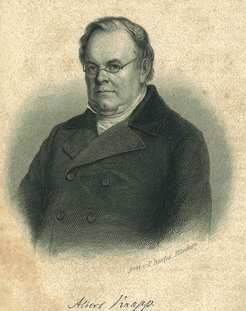Love as a Life Project
Morality, Feeling, and the Pastor in the Awakening Movement of Nineteenth-Century Württemberg
Julia Lieth (completed PhD Project, 2022)

The beginning of the nineteenth century in German-speaking lands was characterized both by tendencies towards secularization and by religious pluralism. The Protestant spectrum in particular was evolving and diversifying. A dialogue between rationalistic, liberal and ‘awakened’ theologians simultaneously reactivated and divided Protestantism leading to intra-confessional ruptures. While churches lost institutional power, religious practices and the experience of particular religious feelings in daily life gained in significance, foremost within awakened circles in their efforts to renew Pietism. In contrast to both rationalistic theology, which looked for truth in reason, and liberal theology, in which truth was linked to historicism as a means for reconciling faith, science, and culture, Pietism, with its origins in the seventeenth century, focused instead on feelings as a pious practice approximating truth. Feeling like a Pietist meant purposely generating Pietist feelings, a practice that arose out of a specific form of moral reasoning. Recognizing love’s significant role within Christianity, the dissertation project traces a variety of forms of Pietist love throughout the life of Württemberg pastor Albert Knapp (1798–1864).
Although Württemberg saw the emergence of some radical Pietist groups, the movement generally remained integrated within the Lutheran state church. Knapp, who is mostly remembered for his literary talent and his involvement in the founding of the first animal protection society in Germany, had a critical view of Pietism throughout his life. From 1845 onwards, he served as pastor at the Church of St. Leonhard in the center of Stuttgart, an important and powerful position that made him a role model for the members of his congregation. The primary source material for the dissertation are Knapp’s papers, which contain a wide range of (auto-)biographical writings. Knapp’s papers offer insights into his professional practices and his moral and theological stances. They also provide a detailed account of his (semi-)private and family life. Analyzed from a micro-historical perspective, these personal papers reveal much about the history of Pietism and the middle class in nineteenth-century Württemberg. Combining this micro-historical framework with the analytical tools of the history of emotions, the dissertation project will make a novel contribution to these fields of historical research.
Proceeding from the assumption that religion and feelings are not constant, but historically contingent phenomena, the dissertation deconstructs the ways in which these phenomena conditioned one another. It traces their individual development, their interrelations, and their meanings in the eyes of the historical actor. The study defines the religious as an intersubjective network between heaven and earth (cf. Robert Orsi), in which love can be studied with respect to its orientations and embodied qualities, its temporalities as well as its relation to secular and diverse religious standpoints. Different chapters of the dissertation will offer a kaleidoscopic view into love’s various manifestations, such as the love of God, brotherly love, marital love, fatherly love, and animal love. Analyzing the emotion knowledge that structured the love experiences in Knapp’s life reveals how their materialization in language and practices constituted a boundary experience, triggering moral negotiations intended to validate awakened and thus “true” experiences of feeling.
